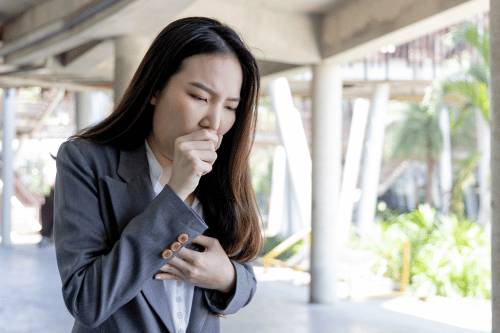Understanding the Connection Between Anxiety and Coughing
Anxiety can trigger many physical symptoms, including a persistent cough, dry cough, and shortness of breath. Stressful situations often cause the body to react in ways that mimic respiratory conditions, including unexplained cough and excessive throat clearing. This anxiety-induced coughing can significantly affect a person’s quality of life, leading to sleep trouble and chronic conditions.
How Emotional Stress Affects the Body
Psychological stress activates the emergency response, causing rapid breathing and shallow breathing. Chronic Stress leads to physical manifestations like chest pain, stomach pains, and heart palpitations. Anxiety-caused stress can also overstimulate the vagus nerve, affecting normal throat sensations and causing a frequent need for throat clearing.
Mechanisms Triggering Anxiety-Induced Cough
Stress responses can heighten the cough reflex, leading to a nervous cough, one of the classic anxiety symptoms. Anxiety-induced coughing may also cause excess mucus production, dry throat, and a sour taste in some cases. Tight chest muscles, poor sleep, and Sleep deprivation from anxiety disorders can worsen the cough experience and lower quality of life.
The “Anxiety-Cough Cycle”
The anxiety-cough cycle is a feedback loop where coughing increases anxiety, and anxiety fuels more coughing. A persistent cough becomes a constant background symptom, creating further psychological distress, feelings of fear, and other anxiety-like symptoms. Over time, this cycle can lead to chronic coughing, Chronic Anxiety Cough, and more frequent episodes of anxiety and panic attacks.
Symptoms of Anxiety-Related Cough
Nervous Cough
A nervous cough often feels dry and occurs in social situations, especially during periods of psychological stress. People with anxiety cough symptoms may experience chest tightness, dry throat, and difficulty taking a deep breath.
Dry vs. Productive Cough
An anxiety cough is typically a dry cough and nonproductive cough. Unlike a productive cough linked to respiratory infection, bacterial infection, or viral infection, an anxiety-induced cough produces little to no mucus or sputum. It may coexist with excess mucus caused by stress responses.
Throat Clearing and Wheezing
Constant throat clearing, rapid breathing, and occasional wheezing are common symptoms of anxiety-related cough. Frequent throat clearing can also result from excess mucus and stress-induced coughing, sometimes referred to as somatic coughing syndrome.
Common Misconceptions
Anxiety Cough vs. Illness Cough
Anxiety cough is a physical symptom without infection and does not present with fever or major respiratory infection symptoms. It differs from a viral infection, sinus infection, respiratory infection, and pulmonary disease which are caused by bacteria or viruses.
Myths About Self-Resolution
Some believe anxiety cough will resolve without treatment, but unresolved chronic anxiety cough can worsen into Somatic cough syndrome. Without professional training and therapy for anxiety disorder, people may continue to struggle with anxiety disorder and physical manifestations like persistent coughing.
Diagnosing Anxiety-Related Cough
Differentiating from Post-Nasal Drip
Post-nasal drip causes excess mucus and throat clearing but often includes sinus issues, sour taste, and runny nose symptoms. Anxiety cough is more tied to psychological stress and issues with anxiety rather than physical infections.
Distinguishing Coughs from Bronchitis and Asthma
Bronchitis and pulmonary disease cause a productive cough, often accompanied by chest pain, fever, and other respiratory infection symptoms. Asthma includes shortness of breath and tight chest sensations, making them different from symptoms of hyperstimulation seen in anxiety.
Comparing to GERD-Related Cough
Gastroesophageal reflux disease (GERD) causes acid reflux symptoms like sour taste, burning chest pain, and stomach acid exposure. GERD-related cough is triggered by stomach acid reflux after eating, while anxiety-induced coughing results from the psychological distress response.
Treatment and Management
Cognitive Behavioral Therapy (CBT) for Anxiety
CBT is an effective treatment for anxiety-induced cough. According to Cognitive Therapy and Research and the American Psychological Association, cognitive-behavioral therapy helps reframe thoughts, change breathing patterns, and manage anxiety disorders signs like persistent coughing.
Breath Control Techniques
Diaphragmatic breathing can counter rapid breathing caused by panic attacks and excessive shallow breathing. Deep Breathing Exercises help regulate breathing patterns, reduce vagus nerve overstimulation, and calm the chest muscles.
Mindfulness and Stress Reduction
Mindfulness, deep relaxation techniques, and progressive muscle relaxation exercises can break the anxiety-cough cycle. Practicing deep relaxation methods lowers anxiety symptoms, strengthens mental health, and improves the response to treatment.
Considering Other Health Conditions
Identifying Physical Causes
Persistent coughing should prompt evaluations for medical conditions like interstitial lung disease, chronic pulmonary disease, and food allergies. Sleep apnea, poor sleep quality, and Allergy cough linked to patients with allergies should also be considered as underlying factors.
Ensuring Comprehensive Care
Healthcare providers may perform the Hyperstimulation Test to assess symptoms of hyperstimulation caused by anxiety. Comprehensive care ensures correct diagnosis by assessing heart rate, breathing patterns, and psychological distress using tests validated by organizations like the American Medical Association.
Seeking Professional Help
Consulting with Healthcare Providers
Experienced therapists and licensed healthcare providers assess cough symptoms, anxiety scores, and constant throat-clearing issues. Professional support ensures a better response between visits and faster symptom reduction.
Participating in Support Groups
Support groups like Discussion Forums and Recovery Support platforms provide emotional support for patients struggling with anxiety and cough. Participating in groups reduces psychological stress, improves coping skills, and helps share personal experience and powerful experiences with others.
Long-Term Strategies for Managing Anxiety
Incorporating Lifestyle Changes
Balanced diets, avoiding tobacco smoke, improving sleep hygiene, and reducing unhealthy stress help lower anxiety scores. Managing food allergies and addressing nutritional deficiencies improve overall health and prevent persistent coughing episodes.
Building Resilience Against Stress
Building resilience includes practicing deep relaxation techniques, regular exercise, mindfulness, and engaging in breathing exercises. These methods improve recovery concepts, improve quality of life, and support patients with depression and anxiety-like symptoms.
Conclusion
Persistent coughing caused by anxiety is a common symptom linked to psychological stress, chronic conditions, and mental health issues. Anxiety cough symptoms are distinct from bacterial infections, acid reflux, and respiratory conditions, requiring a different response to treatment. Cognitive-behavioral therapy, mindful breathing techniques, and professional help are crucial for effective management. Tennessee Behavioral Health offers therapy for anxiety disorder, helping individuals struggling with health anxiety, generalized anxiety Disorder, and chronic coughing to regain control of their daily life. If you experience an anxiety cough, constant throat clearing, or symptoms of hyperstimulation, contact Tennessee Behavioral Health today to connect with an experienced anxiety disorder therapist and explore effective treatment options.

FAQ's
Yes, anxiety and persistent coughing can disrupt oxygen levels and lead to lightheadedness or dizziness during stressful episodes.
An anxiety cough can last for weeks or months if the underlying anxiety disorder is not treated with therapy or lifestyle changes.
No, anxiety-induced coughing is not contagious. It is a physical response to psychological stress, not a viral or bacterial infection.
In some cases, medications for anxiety like SSRIs may help reduce the intensity of anxiety symptoms, including anxiety-related coughing, when prescribed by a doctor.















